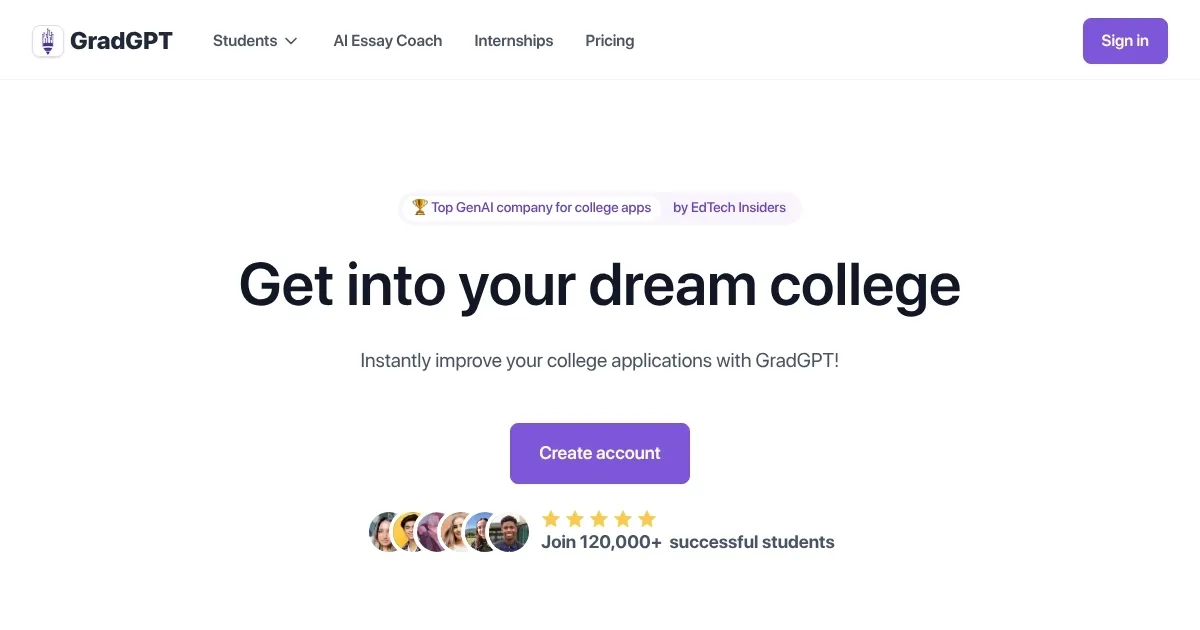GradGPT
GradGPT is an AI platform designed for college application support, focusing on essay review and optimization to increase admission chances at top universities. It processes essays through specialized algorithms that evaluate content against internal college rubrics, identifying issues like structural weaknesses or misalignment with prompts. Key components include the admission officer assessment, which scores essays on criteria such as narrative quality, originality, and emotional impact, and the critical mistakes fixer, which detects rejection risks like inconsistent tone or factual errors. The instant expert feedback feature delivers unlimited reviews in seconds, while the essay score comparison tool benchmarks user work against samples from Yale, Harvard, and Stanford students. Additional functionalities cover college matching based on profiles and high school internship recommendations, all integrated into a central applications dashboard.
The platform processes over 120,000 student applications annually, with data showing more than 16,500 admits to T20 schools in the 2024-25 cycle. It uses machine learning models trained on successful admission examples to provide targeted suggestions, ensuring outputs remain user-driven to avoid AI generation detection by tools like Turnitin or ZeroGPT. Technical implementation involves natural language processing for rubric alignment and sentiment analysis for emotional resonance, with no full essay creation to maintain ethical standards. Pricing includes free trials for select tools and full free access for eligible low-income students via email verification, positioning it as more affordable than human consultants, though premium features require subscription.
Competitors include GradPilot, which offers similar essay reviews with strong AI detection at 99.8% accuracy but focuses less on scoring and more on fraud prevention, and ESAI, which excels in story strategizing for topic development yet provides fewer iteration options. Users report positives like rapid feedback that improves essay scores by up to 40% and accessibility for underserved applicants, but note limitations such as occasional overly broad suggestions and a basic interface that may overwhelm beginners. A surprise element is the inclusion of CV reviewer and recommendation letter builder, extending utility beyond essays.
Feedback from students, parents, and counselors highlights efficiency in reducing application stress and enhancing quality, with examples of admits to UCLA, Duke, and Yale attributed to its use. Drawbacks encompass dependency on initial draft quality and lack of advanced customization for non-standard prompts.
Upload essays early, apply feedback iteratively, and verify changes against personal experiences to ensure alignment before submission.
What are the key features? ⭐
- Admission Officer Assessment: Evaluates essays using internal college rubrics to optimize for admissions criteria.
- Fix Critical Mistakes: Identifies red flags and errors in essays that could result in application rejections.
- Instant Expert Feedback: Delivers unlimited essay reviews and suggestions in seconds for rapid improvements.
- Compare Your Essay Score: Benchmarks user essays against samples from top schools like Yale and Harvard.
- AI Counselor: Provides guidance on college readiness, including matching and internship opportunities.
Who is it for? 🤔
Examples of what you can use it for 💭
- High school senior: Uses the essay reviewer to refine Common App personal statements and supplements for early action deadlines.
- International student: Leverages the AI counselor for college matching and internship suggestions tailored to U.S. admissions.
- First-gen applicant: Compares essay scores against Ivy League samples to build a stronger profile without prior guidance.
- School counselor: Employs instant feedback to review multiple student essays efficiently during peak application season.
- Parent: Applies the critical mistakes fixer to spot issues in their childs drafts, reducing family stress in the process.
Pros & Cons ⚖️
- Rapid feedback
- Ethical suggestions
- Unlimited reviews
- Basic interface
- Generic advice
FAQs 💬
Related tools ↙️
-
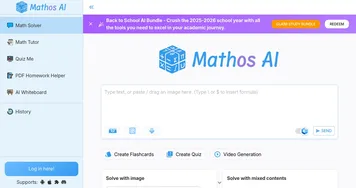 MathGPT Pro
An AI-driven tool created to assist with various mathematical problems
MathGPT Pro
An AI-driven tool created to assist with various mathematical problems
-
 Talkie AI
An AI-powered platform designed to help users improve their conversational experiences
Talkie AI
An AI-powered platform designed to help users improve their conversational experiences
-
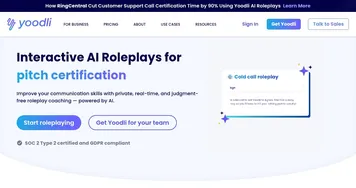 Yoodli
Speech coach for improving public speaking
Yoodli
Speech coach for improving public speaking
-
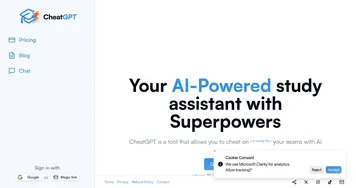 CheatGPT
An AI assistant made to help students find quick answers and improve their learning experience
CheatGPT
An AI assistant made to help students find quick answers and improve their learning experience
-
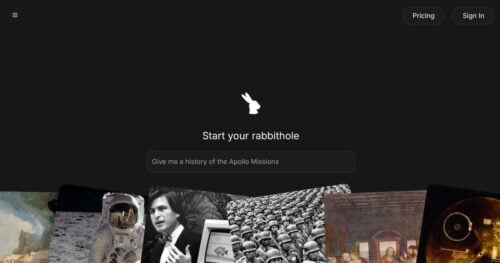 Rabbithole
Explore ideas through AI-guided questions, fostering deep, non-linear learning
Rabbithole
Explore ideas through AI-guided questions, fostering deep, non-linear learning
-
 Mathos AI
Solves complex math problems with step-by-step explanations for students
Mathos AI
Solves complex math problems with step-by-step explanations for students


